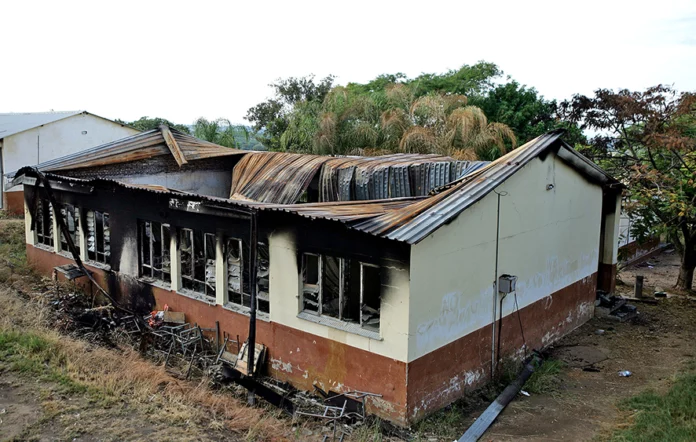A while ago, I found myself in a little village shop in Vuwani, Limpopo. Diagonally opposite the store was a school, several of whose buildings are now roofless. The walls are covered in black soot, which suggests the roofs caved-in during an inferno.
This was confirmed by four young men I found loitering on the shop’s veranda. One of them boasted that he and his friends had burned down the school. He vowed that they would do it again as soon as the school was rebuilt.
The young men’s (non)reason for the arson was more exhausting than the sight of the charred buildings, for in their own words, they did not know why they touched the place of learning… that is if they were telling the truth. If they were, the devil was not only satisfied with commanding their hands, their idle lips were his mouthpiece. A dangerous free-for-all atmosphere of mass hysteria had been created with devastating results.
The atmosphere is symptomatic of underdevelopment, the scramble for access to – in particular – state resources and the paucity of local governance. For long the guarantor of social cohesion, local social bonds began to fray and weaken. But underdevelopment is the real culprit behind the burning of that school and tens of others in the Vuwani district in 2018.
For if you are black and reside in a municipality in a province like Limpopo, from where else do you eke out a living except from the government?
In fairness, governance problems cut across the three spheres of government. Throughout the three spheres, the government is not engaged – let alone appreciative of the need for – a systematic and sustained conversation with the citizenry on the nation’s strategic challenges, which would also inspire the nation’s thinking and behaviour.
It is four years since the wanton destruction took place in Vuwani. Long before that, intermittent acts of the violent destruction of public property had become a feature of our national life. Yet, there is no conversation about it. What if it manifests in different ways in future? It might be that we view incidents like Vuwani as mere police problems. They are
police as they are social problems. And social problems are more layered, nuanced and voluminous than police dockets and legal processes permit.
Underinvestment in national conversations undermines the cultivation of an all-round progressive national consciousness. For this deficit, we are unlikely to grasp and address the hysterical atmosphere that sends young men onto a trail of destruction as ignorant pawns of political and other agendas they do not understand. Which is why some of them, like the Vuwani quartet, commit crimes and proceed to proselytise care-free about them!
Apart from its socio-economic root causes, the anomie demonstrated by the Vuwani gang – and accomplices – is partly a result of the deficit in national conversations.The more the deficit persists, the more opportunistic political elements and social misfits exploit it to their own ends.
The December 1956 edition of the internal bulletin of the erstwhile Diocesan Training College, Grace Dieu Pietersburg, reported on a late 1930s conversation between two missionary teachers about their work.
The one asked the other what he had tried to teach the children who had passed through his hands. To which he replied: “I tried to make very ordinary little boys a little less ordinary.”
So, hardly a novel point is that we ought to place the education system at the centre of producing the kind of South African in whose hands the country’s destiny can be placed without cause for doubt. To that end, we require not only a conversation – and action about the education system – but, most important of all, the South
African teacher.
What is the objective of our teachers? What values are they promoting in our children?
It is a function of leadership – in particular political leadership – which is a subject of another national conversation.
That said, a conversation implies, among others, a feedback and accountability. Those who initiate it should expect to receive complimentary and critical feedback. Their interlocutors also deserve accountability and will demand it because it is in the logic of the process. In any case, human nature is such that people
listen more to those who practice what they preach.
Follow @SundayWorldZA on Twitter and @sundayworldza on Instagram, or like our Facebook Page, Sunday World, by clicking here for the latest breaking news in South Africa. To Subscribe to Sunday World, click here



